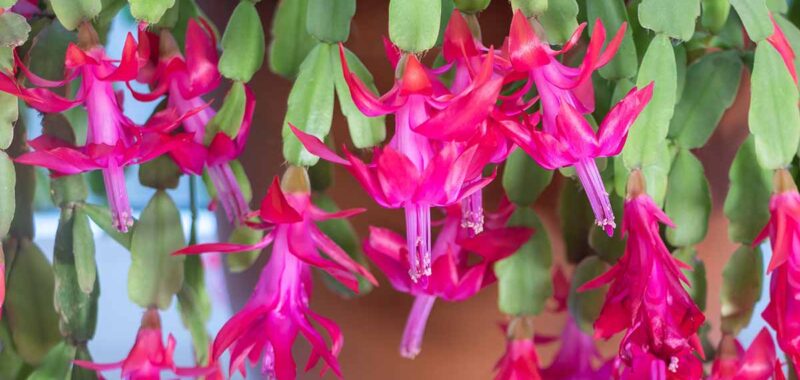If you want to move your specimen to a spot with brighter light, do it gradually as a sudden change in lighting conditions can risk burning the foliage, causing yellow or brown leaves.
2. Over- or Underpotting
These plants like to be a little bit rootbound but not overly crowded. If the houseplant is in a container that is too small or too large, it might not flower.
Ideally, the pot should be about the same size as the root ball or just a smidge larger.


If the container is significantly larger than the roots, remove the plant, brush away the soil from the rootball, and repot in a smaller container.
On the other hand, if it is rootbound and you’re seeing roots coming out of the drainage holes, repot into a container that is one size up.
You can learn how to repot a Christmas cactus here.
3. Pests or Disease
Christmas cacti are pretty tough.
I’m scraping mealybugs off my orchids and scale insects off my staghorn ferns like it’s my full time job, all while repotting droopy philodendrons that I accidentally overwatered.


But my various holiday cacti are just bopping along without any problems.
Still, that doesn’t mean diseases and pest infestations can’t happen and if they do, it can cause a failure to bloom.
Aphids, fungus gnats, mealybugs, scale, spider mites, thrips, and whiteflies all feed on plants in the Rhipsalidopsis and Schlumbergera genera.
Learn about these pests and how to get rid of them in our guide to Christmas cactus pests.
Diseases like bacterial soft rot, damping off, and fusarium wilt are the most common ones you may encounter with your houseplant.
You can learn about all of these in our Christmas cactus growing guide.
4. Temperature Issues
One of the challenges with growing houseplants is that they live in a sort of perpetual spring.
They have no idea if it’s spring, fall, winter, or summer because the light and temperatures are generally pretty consistent.

